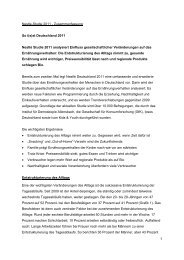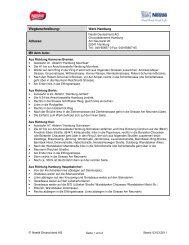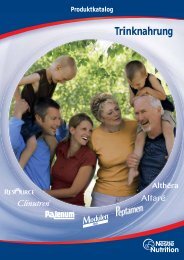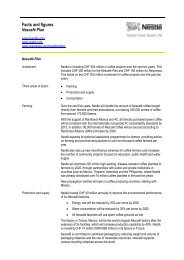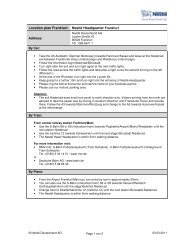Nestlé Consumer Communication Priciples
Nestlé Consumer Communication Priciples
Nestlé Consumer Communication Priciples
You also want an ePaper? Increase the reach of your titles
YUMPU automatically turns print PDFs into web optimized ePapers that Google loves.
Children as consumers<br />
In addition to the above principles for all consumers<br />
(including children), <strong>Nestlé</strong> has developed the following<br />
principles for communication specifically aimed at<br />
children. (By “children” in general we mean those under<br />
12 years, but definitions vary from country to country.)<br />
<strong>Nestlé</strong> must at all times be diligent in applying these<br />
principles, and use common sense and good judgment to<br />
interpret them appropriately for each country.<br />
_ Food products advertised to children must be<br />
appropriate for the specific age range portrayed in<br />
the advertisement.<br />
_ Advertising should not mislead about potential benefits<br />
from the use of the product. Such potential benefits<br />
may include, but are not limited to, status or popularity<br />
with peers, physical growth, strength or proficiency.<br />
_ Our communication must not undermine the<br />
authority of parents. Children shown in our communication<br />
should not be seen urging parents or others<br />
to buy products.<br />
_ Advertising directed to children should not create<br />
a sense of urgency; imply exclusivity, or price<br />
minimization, for example, by using words like “now”<br />
and “only”.<br />
_ Advertising should not portray or encourage behaviour<br />
intended to shock or create anxiety in children, including<br />
use of violence, or sexual innuendo.<br />
_ Fantasy, including animation, is appropriate for younger<br />
as well as older children. However, it should not create<br />
difficulty in distinguishing between the real and the<br />
imaginary.<br />
_ Products developed from or associated with<br />
programme content primarily directed to children<br />
should not be advertised during or adjacent to<br />
that programme.<br />
_ Programme personalities, live or animated, should<br />
not be used to sell products, premiums, or services<br />
in or adjacent to programmes primarily directed<br />
to children in which the same personality or character<br />
appears. In the same way, a character or personality<br />
associated with the editorial content of a print publication<br />
should not be used to sell products, premiums,<br />
or services in the same publication.<br />
_ Sampling and promotional activities in schools and<br />
at events will be done only with the prior agreement<br />
and consent of the school administration and event<br />
organisers. It should comply with applicable legislation<br />
or regulations, and should ideally be accompanied by<br />
some kind of educational nutritional messages.<br />
_ In July 2007 <strong>Nestlé</strong> decided to strengthen its principles<br />
on advertising to children yet further, adding the<br />
following two new provisions to existing ones. These<br />
will be fully implemented in all countries by the end of<br />
2008 at the latest.<br />
> no advertising or marketing activity may be directed<br />
at children under 6;<br />
> advertising for children from 6 to 12 to be restricted<br />
to products with a nutritional profile which helps children<br />
achieve a healthy balance diet, including clear<br />
limits for such ingredients as sugar, salt and fat.<br />
<strong>Consumer</strong>s, diet and physical activity<br />
<strong>Nestlé</strong> believes that individual responsibility and freedom<br />
of choice are basic human rights. However we have a<br />
responsibility to help build awareness of how people can<br />
exercise control over what they eat and drink – to ensure<br />
that they enjoy a balanced diet.<br />
<strong>Nestlé</strong> considers that proper nutrition and adequate<br />
physical activity are integral to maintaining good health.<br />
<strong>Nestlé</strong> develops, produces, and markets a wide range<br />
of foods and beverages. These products satisfy many<br />
consumer needs: nutrient content, variety, pleasure,<br />
and convenience. Every food and beverage has a role<br />
to play in contributing to the consumer’s achievement of<br />
a balanced, healthy diet and overall well-being.<br />
<strong>Nestlé</strong> will provide consumers with helpful, understandable,<br />
and relevant information about the nutritional and<br />
health benefits of its products. We will create or make<br />
use of opportunities for nutritional education – including<br />
the role of regular exercise, a balanced diet, and moderation<br />
in food consumption.<br />
<strong>Nestlé</strong> will not use either extremely thin or obese people<br />
as role models in its communication.<br />
<strong>Nestlé</strong> will encourage and preferably sponsor events that<br />
involve people – and especially growing children – in<br />
healthy, energetic pursuits and lifestyle, with Nutrition<br />
playing a positive role.<br />
© 2007 Nestec Ltd.,<br />
Marketing <strong>Communication</strong>s Department,<br />
Printed by Genoud, Entreprise d’arts graphiques,<br />
Le Mont-sur-Lausanne, Swtzerland




